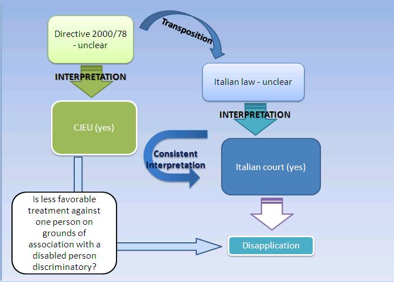Italy, Tribunal of Pavia, Manara v. INPS, Order of 9 September 2009
|
An employee challenged the decision of the National Institute of Social Security (INPS) which determined his ranking for the purpose of an internal promotion. The complaint focused on the fact that INPS had not taken into account, for the purposes of determining his length of service, a period of an unpaid leave of six months. The leave was necessary for him to take care of the mother, who suffered from severe disability as defined in domestic law (cf. Article 3 of Law 104/1992). The failure to take into account this period resulted into a lower score than what would have been given calculating the leave towards his seniority. With its order, the Tribunal of Pavia upheld the applicant’s request for provisional measures. It observed that the domestic provision (Art. 4, paragraph 2 of Law 53/2000) which expressly excluded the computability towards seniority of the period of unpaid leave taken by the employee to look after a disabled relative amounted to direct discrimination, and that it was not supported by any legitimate objective. Therefore, the provision had to be disapplied, and INPS was ordered to upgrade the position of the claimant accordingly. |

- Case C-303/05 Coleman v. Attridge Law & Steve Law [2008] ECR I-560303;
- Case C-180/95Nils Draehmpaehl v Urania Immobilienservice OHG[1997]
Relevant Judicial Dialogue Techniques

